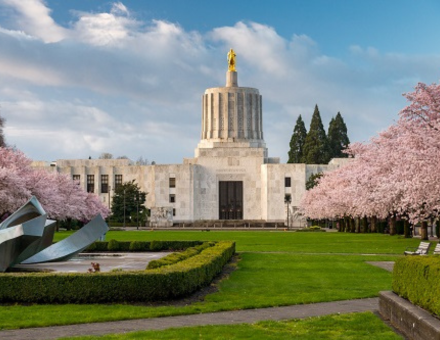SAM Magazine—Salem, Ore., June 19, 2025—Safehold Special Risk will no longer insure ski area clients in Oregon due to the state’s legal climate that has resulted in outsized losses over the past decade. The move appears to have, in part, helped advance a bill that would protect outdoor activity providers from legal action for ordinary negligence by making liability waivers enforceable.  Oregon State HouseThis marks the first time such a bill has reached this stage since similar legislation was introduced 10 years ago.
Oregon State HouseThis marks the first time such a bill has reached this stage since similar legislation was introduced 10 years ago.
Safehold’s departure, which will go into effect in October, will leave its resort clients Mt. Hood Meadows, Timberline, and Cooper Spur, as well as the Wallawa Lake Tramway, without general liability insurance. “If we don’t have that, we won’t be able to operate,” said Mt. Hood Meadows CEO Matthew Drake.
Safehold writes insurance for ski areas in 37 states. According to testimony from Safehold’s Eric Morgan, Oregon accounts for 50 percent of its general liability and excess loss ratios over the past 10 years. “Our historical results from Oregon since 2015 have had a profoundly negative impact on our program’s ability to meet fundamental financial models required to underwrite general liability insurance for ski resorts in Oregon,” he said.
Safehold’s Ryan Patrick added, “We have been insuring in the state for 60+ years, but the current litigation climate is the worst we’ve seen because of the lack of ability to enforce waivers.”
Mt. Ashland general manager Andrew Gast testified at a hearing last week that insurance costs have risen 129 percent in the past 12 years for his ski area.
Timberline’s Jeff Kohnstamm agreed with the Safehold spokesmen that the insurance issue stems from Oregon’s “increasingly unfavorable recreational liability climate.” Oregon is one of the only ski states in the U.S. that does not provide liability protections for the inherent risks associated with participating in downhill skiing and snowboarding, and recent verdicts have set precedents that make liability waivers unenforceable.
A 2014 Oregon Supreme Court verdict against Mt. Bachelor concluded that enforcement of the liability release signed by the injured plaintiff would have been unconscionable. This decision “effectively eliminated exculpatory releases in the state,” said Morgan. A Senate bill that was introduced in 2015 to address the enforceability issue did not make it out of the Senate Judiciary Committee, chaired by Sen. Floyd Prozanski, who is also a prosecutor.
Since then, lawsuits against Oregon ski areas have been on the rise and the 2022 verdict that awarded $11.4 million to an injured mountain biker at Mt. Hood Skibowl exacerbated the insurance crisis.
Following that verdict, a coalition called Protect Oregon Recreation formed—comprised of dozens of outdoor recreation providers and related associations, including the Pacific Northwest Ski Areas Association (PNSAA), which was one of the founders—and started meeting with lawmakers to introduce other legislation to make liability waivers enforceable.
The effort has been met with bipartisan support, but didn’t make it past the Senate Judiciary Committee on two previous attempts. Detractors say passing a bill that makes waivers more enforceable will take legal rights from Oregonians and that gross negligence, which the legislation aims to still hold businesses accountable for, is extremely difficult to prove. Those who support the legislation, which includes insurers and defense attorneys that both benefit from the current legal climate, say that without enforceable waivers, it will be untenable for many outdoor activity providers to operate in the state.
Thirty-three co-sponsors introduced HB 3140 this current legislative session in another attempt to pass waiver protections. NSAA director of risk and regulatory affairs Dave Byrd, who has been working on this issue in Oregon for 10 years and highlighting how Oregon differs on the waiver issue compared to other ski states, said the level of support is "the most co-sponsors of any other piece of legislation pending in the state." But it again didn't make it past the House Judiciary Committee.
Shortly after, Senate Committee on Finance and Revenue chair Sen. Mark Meek amended SB 1196 to include the waiver language from HB 3140. SB 1196 passed in a 3-2 vote on Wednesday, which gives it the opportunity to be brought to a vote on the Senate floor.
According to PNSAA president Jordan Elliott, it's not a foregone conclusion that it will be brought to a vote, but he's confident the vote will pass if it occurs. If it does pass in the Senate, it moves back to the House, where the House Speaker can choose to bring it to a vote or send it back to committee. The latter would effectively stall the legislation for another two years, since Oregon’s current legislative session ends June 29 and next year’s session is only 90 days long.
If this current bill is not made law by the 29th, it would create a precarious insurance situation for Oregon’s ski areas and other outdoor recreation providers.
The only other ski area insurer remaining in the state is MountainGuard, but there’s no guarantee that will last. In a testimony this week, MountainGuard senior vice president and program manager Tim Hendrickson said, “I guess I’m the only one left in Oregon … If we end up with very large verdicts or nuclear verdicts, it’s going to force our hand.”
Editor's note: This article has been corrected to properly name Safehold Special Risk's Oregon clients, that HB 3140 had more co-sponsors than any other bill the House has considered this session, and the language from HB 3140 was added to SB 1196. We apologize for these errors.




